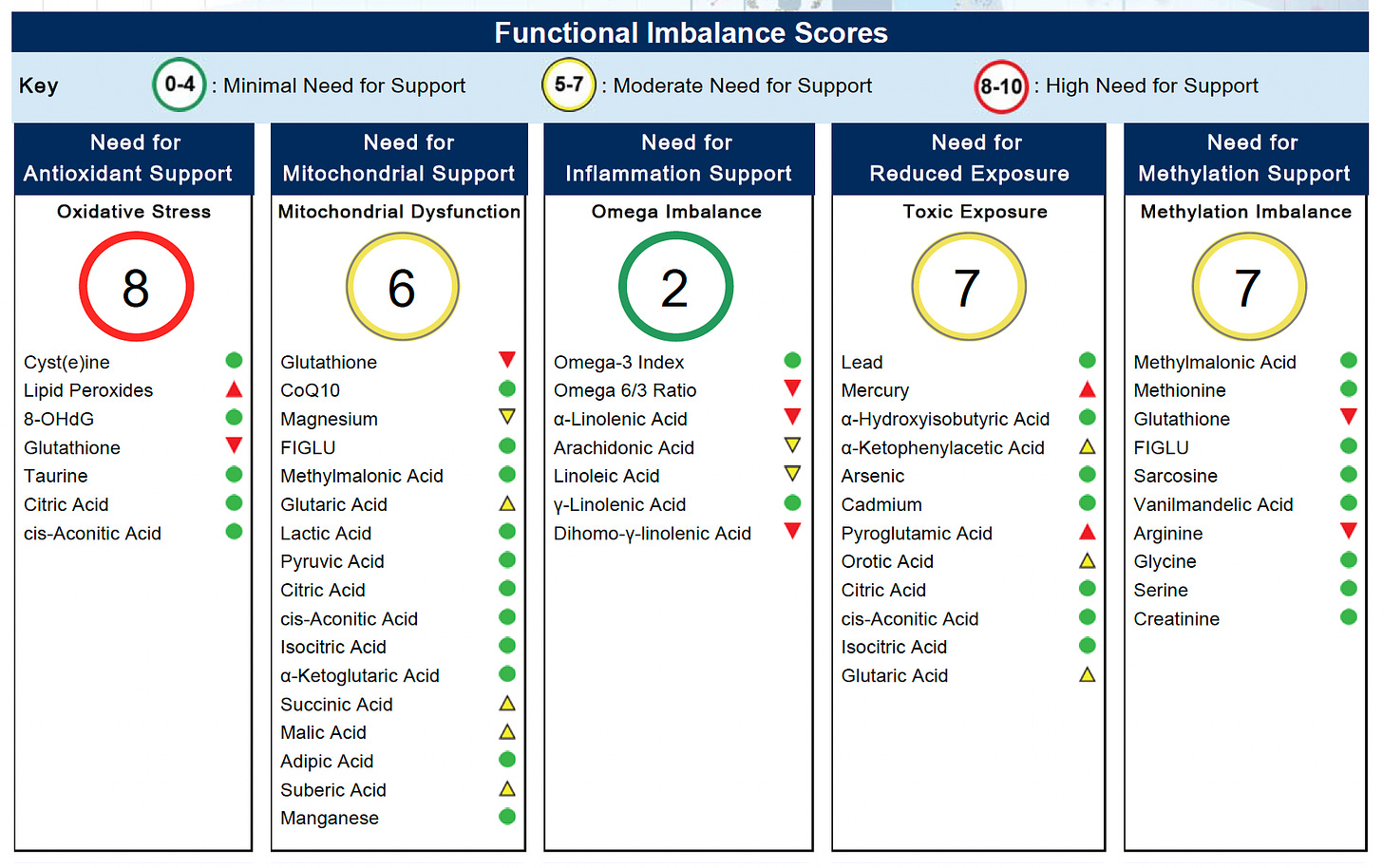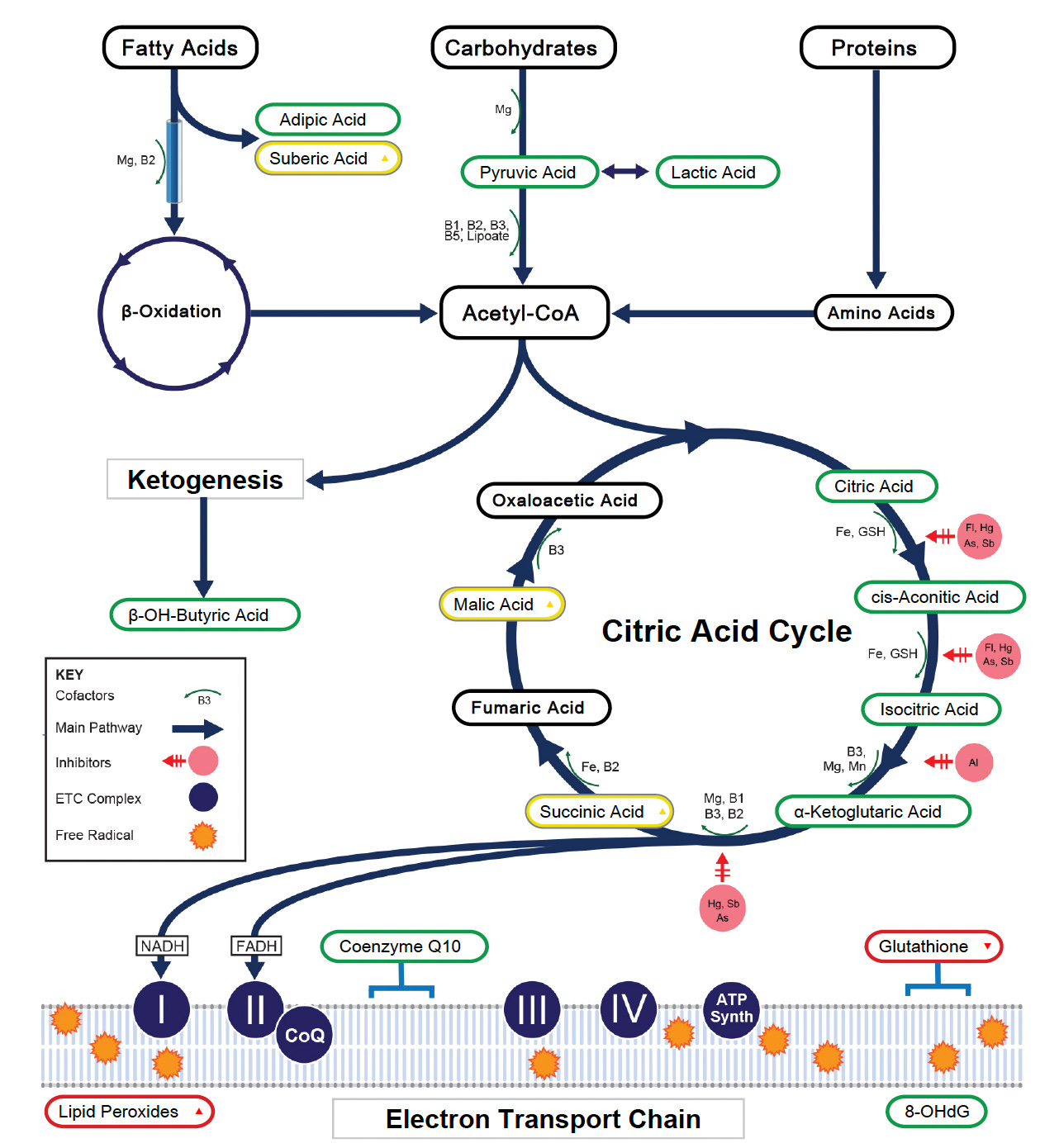My Personal NutrEval Results
Even nutritionists have nutrient deficiencies. Here's what I'm doing about it.
Have you every heard the phrase — You are what you eat?
I’d argue — You are what you absorb.
Even if you’re eating a “healthy diet” you can still have nutrient deficiencies.
Everyone is different in terms of how they digest, absorb, and utilize nutrients from food. And every one burns through the nutrients they consume at different rates. Factors affecting this include stress, genetics, food sourcing, your microbiome, pregnancy/postpartum, even certain medications.
And while there’s usually a root issue that’s caused the depletion (that we need to address)— the first step is repleting what’s been lost to get you feeling better, faster.
Advanced nutrient testing is about more than spotting deficiencies. It gives us an inside look at how effectively your body —
converts food into useable energy
is able to shift between glucose & fat as a fuel source
produces neurotransmitters
supports blood sugar balance
supports detoxification
manages chronic inflammation & stress
Nutrient deficiencies manifest in a variety of ways — from low energy, brain fog, and the inability to lose weight to hypothyroidism, fertility issues, insulin resistance, or autoimmune conditions.
It’s why when a client comes to me and they’ve “tried everything” — I recommend this test. And it’s also why I run one on myself once a year.
Wondering if you should consider this test too?
Honestly, if you’re curious about your nutrient status, want to lose the extra weight, are struggling with low energy, anxiety, poor sleep, are postpartum, trying to get pregnant, or transitioning through perimenopause and have the funds — do it. Especially if your doctor says everything is normal, but you know it’s not.
⇨ I’m running a 40th birthday special for 40% off nutrient testing through August 31st— you can learn more here.
If that’s not an option for you right now, then ask your health care provider to run a few extra tests at your annual physical to help get a better understanding of your body’s nutrient needs.
These include B12, folate, vitamin D, iron/ferritin, magnesium RBC, zinc RBC, and selenium. For a look at your mitochondrial health, make sure they run fasting insulin in addition to testing fasting glucose and hbA1c. For inflammation, you want to look at hs-CRP, homocysteine, and antinuclear antibodies (ANAs).
Okay, now that you have an idea about WHY we need to know our nutrient status on such a deep level — let’s dive into my personal results so you can see it at work first hand.
My Personal NutrEval Results
It’s a lengthy set of data points, so I’m sharing the highlights and synopsis here along with what I’m doing about it.
⇩ This is the summary from the first page of the report. It gives a high-level overview of where you need the most support nutritionally and through lifestyle too.
See? Even us nutritionists need to support our nutrition in targeted ways. It’s more than simply getting enough protein and eating your greens.
My biggest offenders are oxidative stress (8) and toxin exposure (7). There are also some blocked pathways preventing my mirochonidqa from functioning optimally (i.e. producing ATP energy). I’m not worried about the high methylation score of 7 as once I get my oxidative stress in order it should trend lower naturally.
Do you see the common nutrient I’m depleted in?
It’s glutathione, the body’s master antioxidant. In the liver, it plays a key role in detoxification, helping to eliminate harmful substances. In our mitochondria, it’s involved in ATP synthesis, the process that creates the energy currency of our cells. Adequate ATP levels are essential for feeling energized and supporting a healthy weight as they fuel physical activity and metabolic processes.
I’m also showing high mercury levels, which contribute to my body’s overall toxic load and the need for increased antioxidant activity and liver support. High mercury levels may also be what’s keeping my body in an more inflammatory state and triggering my auto-immune thyroid condition.
⇩ You can see here the full energy cycle — how we turn the food we eat into fuel. Or conversely, where the blocks are preventing this essential process from happening.
For me, there are a few B-vitamin deficiencies, a need for magnesium (very common), and you can also see where the high mercury (Hg) and low glutathione (GSH) are slowing down the citric acid cycle. The high lipid peroxides (free radical damage because of low antioxidant levels) are also interrupting the electron transport chain — the final stage of ATP production.
It’s a complex symphony that I just love nerding out about.
So, what am I doing about my results?
The two biggest things I need to support are 1) my antioxidant levels and 2) detoxification pathways. Along with some targeted supplementation to support mitochondrial health and specific deficiencies noted on the test.
Here’s my personal protocol —
Disclaimer: As always, please consult with your health care provider before adding or altering your personal supplement or medication regimen. This article is for educational purpose only.









